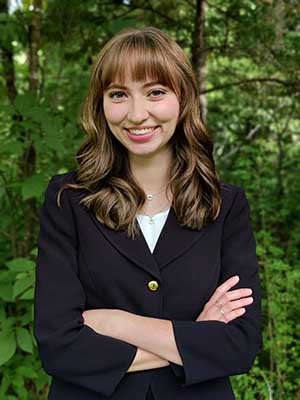Alumna using Phi Kappa Phi Fellowship, research experiences to advance graduate studies in urban planning

 One summer morning, Claire Patrick ’22 and her mentor, urban geographer Colleen Hammelman, settled in at a Colombian bakery on Atlanta’s Buford Highway. A bell over the door chimed an alert to people’s comings-and-goings, while the aroma of oranges scented the air in the bustling, inviting neighborhood spot.
One summer morning, Claire Patrick ’22 and her mentor, urban geographer Colleen Hammelman, settled in at a Colombian bakery on Atlanta’s Buford Highway. A bell over the door chimed an alert to people’s comings-and-goings, while the aroma of oranges scented the air in the bustling, inviting neighborhood spot.
Patrick and Hammelman were there to talk with people about how development is affecting the foodscapes and other community features for longer-term immigrants who live and work in the neighborhood. What she saw and heard shaped Patrick’s thinking about how spaces and places affect lives — while confirming her future career path.
“Throughout my undergraduate career,” she explained, “I had the privilege of serving as a research assistant on projects pertaining to poverty suburbanization, immigrant food landscapes, the Charlotte food system and affordable housing. Many of the topics I explored are rooted in the historical inequities within city planning, which will be exacerbated by the climate crisis. I want to meld technology and equitable planning strategies to ensure that in the future our cities are healthy, just and sustainable.”
Patrick graduated in May 2022 with a bachelor’s degree in geography, minors in public health and religious studies and University and Geography and Earth Sciences Honors. She earned a Bonnie E. Cone Scholarship, was a member of the Global Engagement Scholars Program and concentrated her geography studies in GIScience and technology, as just a few of her many accomplishments.
Phi Kappa Phi Fellowship aids graduate studies
Now, supported in part by a national Phi Kappa Phi Graduate Fellowship, Patrick is studying urban planning in the master’s program at Georgia Tech’s School of City and Regional Planning. The Charlotte Phi Kappa Phi chapter nominated her for the fellowship.
“My Phi Kappa Phi award is helping give me opportunities to work toward making our spaces and places healthy and sustainable,” Patrick said. “Ultimately, I hope to pursue work as an urban planner specializing in climate change mitigation for a large metropolis, and this award has generously helped me get closer to my goal.” Patrick also has received funding support from Georgia Tech.
Hammelman, who worked with Patrick for two years, describes her as one of the top undergraduate students she has known, pointing to Patrick’s research and communication skills in particular.
“She distinguished herself as an intelligent and dedicated scholar in summer 2021 as a research assistant for my study focusing on the impact of urban restructuring on migrant place-making in the U.S. Southeast,” Hammelman said. “In this role, she created maps in ArcGIS to visualize the racial composition of schools in our study areas, participated in and transcribed in-depth interviews and utilized ArcGIS field maps to identify neighborhood landscape change.”
Patrick completed honors capstone research on the history of urbanization and agriculture in Charlotte and the consequent impacts on contemporary urban agriculture processes. She pored over historical land use maps, conducted interviews and analyzed oral histories from Charlotte’s collection, “The Queen’s Garden: Oral Histories of the Piedmont Foodshed,” to see what farmers think about changes in urban agriculture and development.
“This research,” said Hammelman, who also is director of the Charlotte Action Research Project, “is significant in a context of rapid urbanization in Charlotte as well as a growing public demand for urban and local agriculture during the pandemic. Claire designed this independent, mixed methods research that nicely built on her expertise in urban geography, food systems, and spatial analysis.”
Interdisciplinary studies, research feed Patrick’s curiosity
When Patrick came to Charlotte as a freshman, she already was curious about how places shape the health and well-being of communities. Her budding interest bloomed through an interdisciplinary studies approach and research opportunities including with Erin Banks, Nhi Cao, Nicole Peterson and J. Claire Schuch.
“The incredible professors in the Geography and Earth Sciences Department exposed me to geographic thought and the burgeoning field of geospatial analytics,” Patrick said. “The public health minor taught me the intersections of health and place, and the religious studies minor helped deepen my thinking on diverse worldviews and perspectives. Combined, my fields of study have pushed me to pursue research and interdisciplinary spaces with a focus on making communities healthier and more livable.”
Patrick singled out Honors College Dean Malin Pereira and Andrew Keener, scholars advisor, for their help in the application process for the Phi Kappa Phi award and offered gratitude for others who have helped her along the way. “I would also like to extend my deepest gratitude to everyone I have had the privilege of learning from in my time at UNC Charlotte,” she said. “I hope to make you all proud.”